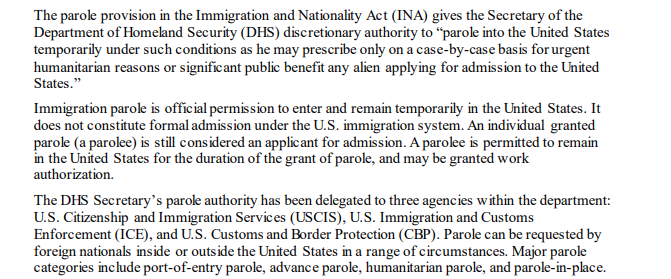Primer: The Biden Administration is legislating ignoring Congress.

EXCLUSIVE: At least 160,000 illegal immigrants have been released into the U.S., often with little to no supervision, by the Biden administration since March – including a broad use of limited parole authorities to make more than 30,000 eligible for work permits since August, Border Patrol documents obtained by Fox News show.
The documents give a partial snapshot into how the Biden administration has been releasing enormous numbers of migrants into the U.S., often with little to no oversight, supervision or immediate risk of deportation.
Since March 20, at least 94,570 illegal immigrants have been released into the U.S. with Notices to Report. Those who receive such a notice are only required to check in with an ICE office when they get to their final destination – which could be anywhere across the country. Those who check in are not deported or detained as their immigration proceedings move forward.
Meanwhile, since Aug 6th, the administration has released roughly 32,000 immigrants into the U.S. via parole – which gives migrants a form of legal status and the ability to apply for work permits.
Federal law says parole authority is to be used on a case-by-case basis for “urgent humanitarian purposes” and “significant public benefit.” Typically only a handful of parole cases are granted by officials, but the Biden administration has been using it more broadly, including in its parole of tens of thousands of Afghans into the United States as part of Operation Allies Welcome.
Former Border Patrol Chief Rodney Scott, who served under President Biden, reviewed the documents and told Fox News that he believes the administration is abusing its parole authority.
“By law and regulation a parole shall only be granted on a case by case basis and only for significant humanitarian reasons or significant public benefit. Neither of these appear to apply to the current situation,” he said, adding that the number of paroles brings into question the review and approval process.
“As a field chief, I don’t believe I ever approved more than 5 or 10 paroles in a year,” he said. “When I did, I ensured that the alien was monitored continuously and was detained or removed as soon as the circumstances allowed.”
The documents also show that since Aug 6, the administration has released an additional 40,000 illegal immigrants on their own recognizance. The documents also show that on one single day in Del Rio sector, 128 single adult illegal immigrants were released into the U.S. without ATD – which typically includes tracking by an ankle monitor or phone.
A Customs and Border Protection (CBP) official told Fox that mechanisms like paroling, the use of NTRs and enrolling migrants in Alternatives to Detention (ATD) “provides mechanisms to require family units released from CBP custody to report to ICE within a specified time.”
The official also cited figures that show that between 2014 and 2020, 81% of those released into the U.S. did report in for their immigration proceedings.
The agency has not released its numbers for September, but in both July and August there were more than 200,000 migrant encounters, marking some of the highest numbers in two decades. Since then, migrants have kept coming in large numbers. According to the documents, Rio Grande Valley encountered 5,900 migrants in one week, while Del Rio encountered more than 2,900 in the same period.
DHS Secretary Alejandro Mayorkas, who has repeatedly claimed that the border is not open, reportedly warned officials of a worst case scenario of up to 400,000 encounters if Title 42 public health protections were ended.
Republicans have blamed the Biden administration’s rapid rollback of Trump-era border protections for the ongoing crisis at the border. The administration however has focused on an explanation emphasizing “root causes” like poverty, corruption and violence in Central America.
“The downturn in economies, the attendant rise in violence, the downturn in economies made more acute by reason of the impact of the COVID-19 pandemic, the suppression of any humanitarian relief over the past number of years, and the pent-up thirst for relief among many different populations,” Mayorkas told Yahoo News this week. “I think an accumulation of factors contributes to the rise in migration that we’ve seen.”




